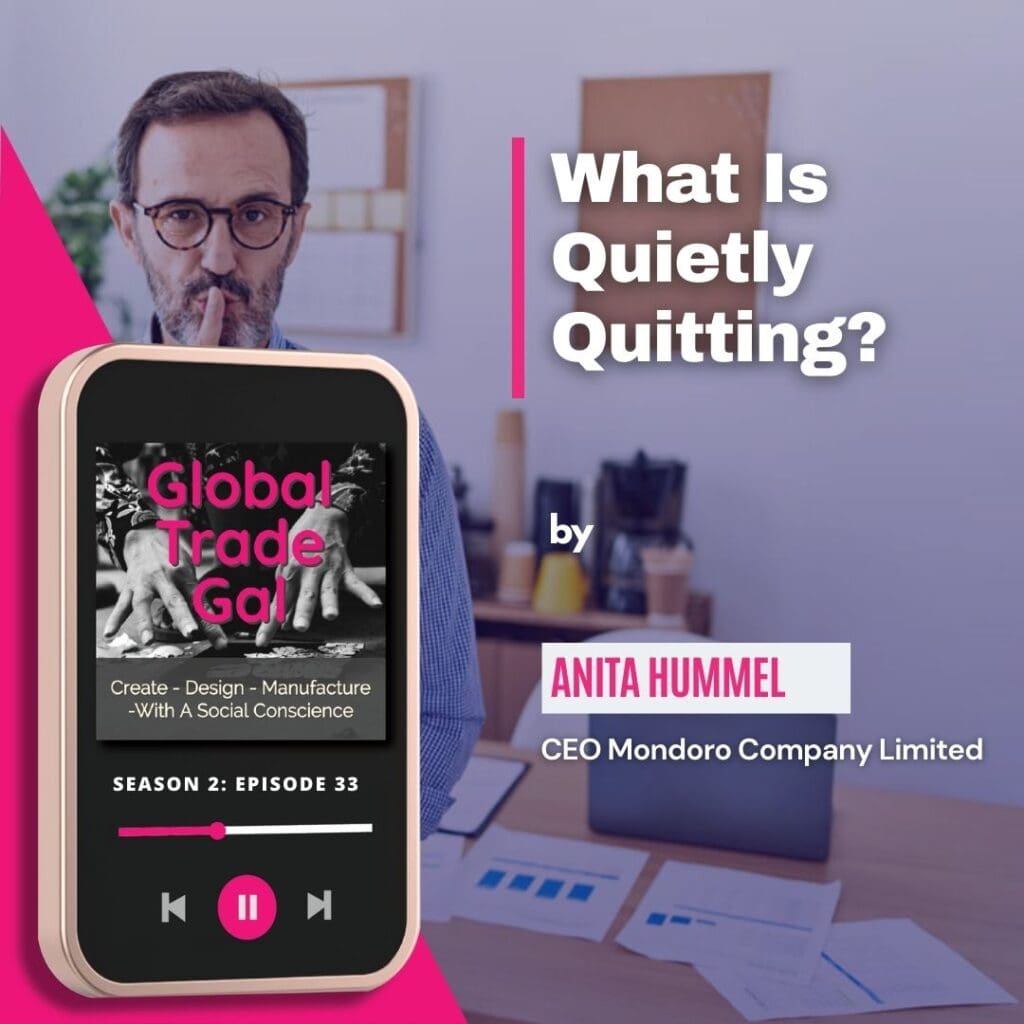A new trend is taking over the working world called “quietly quitting.” This new operating trend has been taking the world by storm.
Quietly quitting is when workers decide they will do no more than what is required. They decide that they will do the bare minimum. Quietly quitting started in China and was known as “lying down.” We do not believe “quietly quitting” is a good idea since it hurts the employee or the employer – both get hurt by this behavior.
Table of Contents
- What Is Quietly Quitting?
- Why Quietly Quitting Is Not A Good Idea
- Your Are Replaceable
- Remote Works Also Means Anyone Anywhere Can Be Hired
- Companies Will Figure Out You Are Quietly Quitting
- It Will Hurt Productivity For The Entire Company
- It Will Ultimately Hurt Your Long-Term Prospects.
- If You Hate Your Job Quit
- Do Not Expect To Get Paid For Not Working
- You Can Work Hard And Have A Work-Life Balance
- 10 Ways AI is Transforming the World and the Workforce
- 5 Ways To For Workers to Survive Through the AI Revolution
- Related Content
What Is Quietly Quitting?
Quietly Quitting is when workers decide they will not do anything more than their job description. For many, it is about working only 9 to 5, nothing overtime. They will not take on extra work, nor will they work extra hours or take on additional projects or even answer the phone or email after working hours.
For some, “quietly quitting” is about having a work-life balance.
It may surprise many that the “quietly quitting” trend overtaking the world started in China. In China, the movement was called “lying down.”
Anyone who has lived and worked in China knows that it is hard to describe how hard some factory workers have to work. Many will stay at the factory and not see their families for months and months at a time; for many, only once a year during the Lunar New Year holiday.
It can be common to go into a factory and discover that some workers will work 28 out of the 30 days a month. Their work time is compensated with longer times off during the Lunar New Year, but for many, their work is their life, and their life is their work.
So it is no surprise that the “quietly quitting” trend started in China. In all fairness, we also need to consider China’s origins of working, which are very different from what many American or European workers have to tolerate.

Most of us in the west have a much better work-life balance than many of these workers in China who are working long hours in a Chinese factory. Some workers working long hours, long weeks, and even long months, ensure they have little work-life balance.
Many of those workers have told me they prefer to work at the factory and have a more extended holiday during the Lunar New Year to spend time with their families. Many are not forced to work long hours but do it by choice.
The ”lying down” in China started during COVID when many of the younger Chinese workers discovered that they could choose not to have the same kind of “hard-working” life as their parents.
Why Quietly Quitting Is Not A Good Idea
Even though I understand the “quietly quitting” trend, I feel it is not a good idea. First of all, most Americans and westerners can hardly compare their work-life balance to that of many the Chinese, especially the factory workers.

For someone who has just started a career, it could derail your career. Here are some of our reasons why quietly quitting is a bad idea for most people:
Your Are Replaceable
There has been an attitude lately that people feel because the unemployment rate is low that, you are not replaceable. The truth is that everyone is replaceable.

If you value your job and want to rise in your career, you should do the best job possible. Quietly quitting is the opposite; you are telling your boss and everyone else that you are replaceable. Chances are you will be replaced by someone who wants to work.
Remote Works Also Means Anyone Anywhere Can Be Hired
In the remote work world, it also means that companies can start to hire people offshore. If a company can not find people willing to work in their own country, like the United States, they will begin looking overseas to find people who want to work.

Those overseas workers may not have the same skills you have, but someone willing to learn, be a team player, and want to work may be a better overall choice than someone who has decided to quit quietly or does not care.
Companies Will Figure Out You Are Quietly Quitting
A company will figure out you are quietly quitting. It may take a while, but eventually, they will catch on.

Most companies will see quietly quitting as cancer that could spread throughout their company. They may decide the best thing is to cut out the “quietly quitting” cancer before it spreads.

Listen To Our Podcast, What Is Quietly Quitting? Below or by clicking here.
It Will Hurt Productivity For The Entire Company

Quietly quitting can hurt productivity for the entire company. This is another reason why if you decide to quit quietly, especially if you are in a position of authority, the company may choose you are replaceable and expendable.
It Will Ultimately Hurt Your Long-Term Prospects.
Quietly quitting will hurt your long-term prospects. Not only will you lose out on learning things you could have learned by working hard, but it can also hurt your chance to get another good job.
If You Hate Your Job Quit
If you hate your job, quit it and get a new one. Nothing says you need to stay at a job you hate.

Be honest with yourself and others, and if you hate your job, look for a new one, but do not do the destructive behavior of quietly quitting or sitting at your desk and not working.
Do Not Expect To Get Paid For Not Working
You should not expect to be paid for not working. If you want to get paid for working, then work. If you want to sit around and do nothing, then do not expect to be paid.
You Can Work Hard And Have A Work-Life Balance
I believe you can work hard and have a work-life balance. It may take some time to figure out, but it can be done, and many people have done it. You must know when to say no to a project and ask for time off. Most employers, if they see you are working hard, will also want to see you have a work-life balance.

But if they know you are quietly quitting, then everything you do could be questioned – and rightfully so, as you have already shown your employer that you will only do and contribute the bare minimum.
We believe in a work-life balance, but we do not believe the quietly quitting phenomena that has taken over the world is the answer. The answer is that you need to find your work-life balance while at the same time working hard and making your career a priority.
10 Ways AI is Transforming the World and the Workforce
Artificial Intelligence (AI) is a revolutionary force that is reshaping industries, economies, and societies worldwide. While it holds incredible potential for improving our lives, it also necessitates a significant shift in how we approach work.
Contrary to the fear that AI will replace jobs and lead to less work, it’s becoming increasingly clear that we need to work harder and smarter than ever before. That is also a reason why “quietly quitting” is not a good idea.
Here are ten ways AI is changing the world and why our effort is more critical than ever:
1. Automation of Repetitive Tasks
AI can automate repetitive, mundane tasks, freeing up human workers to focus on more complex and creative aspects of their jobs.
2. Enhanced Productivity
AI-powered tools and software can boost productivity by providing real-time data analysis, insights, and recommendations, helping workers make more informed decisions.
3. Improved Healthcare
AI assists medical professionals in diagnosing diseases, analyzing patient data, and developing personalized treatment plans, ultimately improving healthcare outcomes.
4. Enhanced Customer Service
Chatbots and virtual assistants powered by AI can handle routine customer inquiries, allowing human customer service agents to address more complex issues.
5. Precision Agriculture
AI-driven agriculture technologies optimize crop yields, reduce resource waste, and help meet the growing demand for food in an environmentally sustainable way.
6. Innovative Education
AI can provide personalized learning experiences, adapt to individual student needs, and support educators in delivering quality education.
7. Safer Work Environments
In industries like manufacturing and construction, AI-powered sensors and robotics enhance safety by automating dangerous tasks and monitoring for potential hazards.
8. Financial Insights
AI algorithms analyze vast datasets to provide valuable financial insights, aiding businesses in making informed investment and financial decisions.
9. Accelerated Research
AI accelerates scientific research by sifting through enormous datasets, identifying patterns, and aiding in the development of new treatments, materials, and technologies.
10. Customized Consumer Experiences
AI-driven recommendation engines personalize the consumer experience, increasing customer satisfaction and driving business growth.
5 Ways To For Workers to Survive Through the AI Revolution
AI is here to stay and will continue to be a part of the world for many years to come. So it is essential to recognize that these advancements don’t equate to a reduction in the need for human effort. In fact, they highlight the importance of human skills such as creativity, critical thinking, emotional intelligence, and adaptability.
Here’s why we need to work harder:
1. Upskilling and Adaptation
- As AI takes on routine tasks, workers need to acquire new skills to operate, maintain, and innovate alongside AI systems.
2. Ethical Oversight
- The ethical use of AI requires vigilant monitoring and governance, necessitating additional effort to ensure AI aligns with societal values.
3. Continuous Learning
- The rapid pace of AI advancement means that workers must engage in continuous learning and professional development to stay relevant.
4. Creative Problem Solving
- AI can handle routine problems, but complex challenges often require creative thinking and human ingenuity.
5. Human-AI Collaboration
- The most significant gains will come from humans and AI working together synergistically, necessitating effective collaboration skills.
AI is a transformative force with the potential to make the world better. However, it also underscores the importance of human effort, adaptability, and continuous learning. Instead of fearing job loss, we should embrace AI as a tool that can enhance our capabilities and drive us to work harder, smarter, and more creatively in a rapidly evolving world.
Find out more about how Mondoro can help you create, develop, and manufacture excellent home decor and home furniture products – don’t hesitate to contact me, Anita. Check out my email by clicking here or become a part of our community and join our newsletter by clicking here.
Mondoro gives out a FREE Lookbook to anyone interested. You can receive a copy of our latest Lookbook by clicking here.
Listen to our Podcast called Global Trade Gal. You can find it on all major podcast platforms. Try out to listen to one of our podcasts by clicking here.
Subscribe to our Mondoro Company Limited YouTube Channel filled with great videos and information by clicking here.
Related Content
Don’t Confuse Activity With Productivity & Other Myths
Being busy or having a lot of activities and things to do is not the same thing as productivity. Productivity is when you do those activities and things that help you focus on the company’s growth. Busyness or being busy is not the same thing as being productive.
You can discover more by reading Don’t Confuse Activity With Productivity & Other Myths by clicking here.
Communism And Productivity – Why It Does Not Work
Communism is the common ownership of production; each person in a communist society will get the same reward whether they work hard. The concept of Communism goes against the principles that make productivity work. People work harder when there is some incentive to want to work harder.
You can discover more by reading Communism And Productivity – Why It Does Not Work by clicking here.
8 Reasons Productivity Makes You Happy
There are many ways that productivity can help to make you happy. Studies have shown that some of the most productive people are also the most content. Productive people accomplish things, learn new things, achieve goals, and do the other things in life that help ensure they are effective and happy. The good news is that productivity can help to make you happy.
By clicking here, you can discover more by reading 8 Reasons Productivity Makes You Happy.


